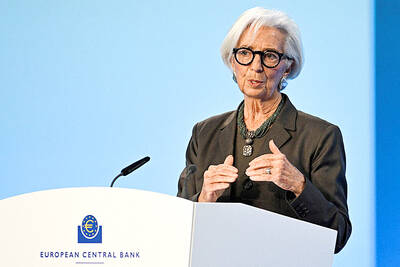MediaTek Inc (聯發科), the world’s biggest supplier of 5G smartphone chips, yesterday raised its revenue growth target for this year to more than 45 percent, after strong demand mainly for its mid-range and premium 5G chips pushed net profit to a record high last quarter.
The Hsinchu-based chip designer had three months earlier projected a 40 percent growth from NT$322.16 billion (US$11.48 billion) last year. MediaTek expects next year to be another growth year, with a higher 5G penetration rate and accelerating digital transformation during the post-COVID-19 pandemic era.
The company also gained confidence about its gross margin improvement on the expectation that it would this year reach the high end of its original estimate of 40 to 46 percent.

Photo: Vanessa Cho, Taipei Times
With growth momentum continuing to build up, MediaTek expects revenue to reach US$20 billion within two years, double last year’s figure.
“We already have enough growth upsides from our current four major business groups to achieve revenue of US$20 billion,” MediaTek chief executive officer Rick Tsai (蔡力行) told an online investors’ conference yesterday.
Smartphone chips were the biggest revenue contributor with a 57 percent share last quarter, after growing 143 percent year-on-year, the company said.
With its new premium Dimensity 1000 series gaining traction, MediaTek said that it has gained market share in the high-end segment during the first half of this year.
Pressing further into the turf of its major competitor Qualcomm Inc, MediaTek is making inroads into the higher-end segment to supply chips for flagship mobile phones.
The company said it plans to debut its first flagship 5G smartphone chip, made by Taiwan Semiconductor Manufacturing Co’s (台積電) 4-nanometer technology, by the end of this year.
The new chip would be used in a key customer’s new flagship model to be launched early next year, it said.
MediaTek said revenue growth was across the board, with robust demand also from Wi-Fi chips, TV chips and chips used in tablets, Internet of Things devices and power management chips.
Revenue is to expand 29 to 36 percent year-on-year to between NT$125.7 billion and NT$131.9 billion in the current quarter. Gross margin is estimated to be in the range of 44.5 to 47.5 percent.
MediaTek said it expects overall market demand to be healthy in the second half of this year, shrugging off speculation about a sag in mobile phone demand in emerging markets.
In the April-to-June quarter, net profit more than tripled to NT$27.59 billion, from NT$7.31 billion in the second quarter last year. That meant a quarterly increase of 7 percent from NT$25.78 billion.
Earnings per share jumped to NT$17.44 last quarter, from NT$16.21 in the first quarter and NT$4.58 in the second quarter last year.
Gross margin climbed to 46.2 percent during the quarter that ended on June 30, compared with 43.5 percent in the same quarter last year and 44.9 percent last quarter.

European Central Bank (ECB) President Christine Lagarde is expected to step down from her role before her eight-year term ends in October next year, the Financial Times reported. Lagarde wants to leave before the French presidential election in April next year, which would allow French President Emmanuel Macron and German Chancellor Friedrich Merz to find her replacement together, the report said, citing an unidentified person familiar with her thoughts on the matter. It is not clear yet when she might exit, the report said. “President Lagarde is totally focused on her mission and has not taken any decision regarding the end of

French President Emmanuel Macron told a global artificial intelligence (AI) summit in India yesterday he was determined to ensure safe oversight of the fast-evolving technology. The EU has led the way for global regulation with its Artificial Intelligence Act, which was adopted in 2024 and is coming into force in phases. “We are determined to continue to shape the rules of the game... with our allies such as India,” Macron said in New Delhi. “Europe is not blindly focused on regulation — Europe is a space for innovation and investment, but it is a safe space.” The AI Impact Summit is the fourth

CONFUSION: Taiwan, Japan and other big exporters are cautiously monitoring the situation, while analysts said more Trump responses ate likely after his loss in court US trading partners in Asia started weighing fresh uncertainties yesterday after President Donald Trump vowed to impose a new tariff on imports, hours after the Supreme Court struck down many of the sweeping levies he used to launch a global trade war. The court’s ruling invalidated a number of tariffs that the Trump administration had imposed on Asian export powerhouses from China and South Korea to Japan and Taiwan, the world’s largest chip maker and a key player in tech supply chains. Within hours, Trump said he would impose a new 10 percent duty on US imports from all countries starting on

STRATEGIC ALLIANCE: The initiative is aimed at protecting semiconductor supply chain resilience to reduce dependence on China-dominated manufacturing hubs India yesterday joined a US-led initiative to strengthen technology cooperation among strategic allies in a move that underscores the nations’ warming ties after a brief strain over New Delhi’s unabated purchase of discounted Russian oil. The decision aligns India closely with Washington’s efforts to build secure supply chains for semiconductors, advanced manufacturing and critical technologies at a time when geopolitical competition with China is intensifying. It also signals a reset in relations following friction over energy trade and tariffs. Nations that have joined the Pax Silica framework include Japan, South Korea, the UK and Israel. “Pax Silica will be a group of nations